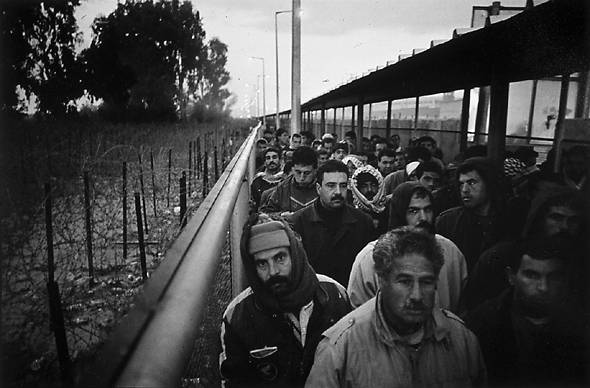Palestinian workers demand payment of overdue salaries
The unrest occurred ahead of a meeting in the Gaza Strip between Prime Minister Ismail Haniyeh of Hamas and moderate President Mahmoud Abbas. The two men, involved in a power struggle since Hamas defeated Abbas' Fatah Party in legislative elections in January, hoped to iron out their differences, officials said.

Haniyeh has complained that Abbas has stripped the government of many of its powers. Abbas, who seeks a resumption of peace talks withIsrael, wants Hamas to soften its hard line against the Jewish state.
"They are going to discuss every small issue and every big thing, whether financial or security," said Azam al-Ahmed, a Fatah official who met with Haniyeh earlier Saturday to prepare for the evening meeting. "We hope through dialogue we can reach something realistic."
Hamas, sworn to Israel's destruction, has come under intense international pressure to change its ways. After the Cabinet took office in late March, the U.S. and European Union, the two biggest donors to the Palestinian Authority, cut off hundreds of millions of dollars in aid, demanding the militant group renounce violence.
Hamas has rejected the calls, despite a financial crunch that has left the treasury broke and unable to pay the salaries of 165,000 government workers for the past two months. The government is by far the largest employer in the West Bank and Gaza Strip, and many families are scraping by on dwindling savings, loans and handouts.
Teachers at five schools in the West Bank city of Hebron canceled classes on Saturday to demand their salaries. While the strike affected only a small number of the city's schools, it marked a turning point.
The Palestinian public has largely backed the government's contention that the crisis is the result of Western hostility to Hamas and so far has heeded calls to remain patient.
"I haven't received a salary for 66 days. Of course I'm not happy with the government," said one teacher. "I need to live and I need to feed my children." The teacher, a father of six, asked that his name be withheld, fearing he could lose his job for speaking to the media.
In Nablus, also in the West Bank, hundreds of government workers demonstrated to demand their salaries.
"This government, if it can't continue, has to think carefully about its people and change its political way of thinking," said Sheik Majed Dwikat, a local religious leader.
Most of the participants at the Nablus rally were Fatah supporters, reflecting the growing tensions with Hamas. Fatah dominated Palestinian politics for four decades before losing the January parliamentary vote.
Much of the power struggle between Hamas and Abbas, who was elected in separate presidential elections last year, has focused on control over Palestinian security forces.
Intensifying the rivalry, Hamas said Saturday that a new security unit headed by a top militant wanted by Israel will begin operating later this month. Hamas announced formation of the force last month in response to Abbas' decision to appoint a loyalist as head of three agencies controlled by the Interior Ministry.
Subscribe to Pravda.Ru Telegram channel, Facebook, RSS!


